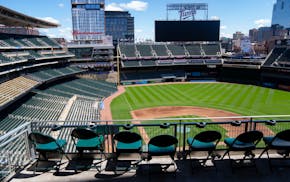If Super Bowl LII is your first visit to U.S. Bank Stadium, these quick facts will get you up to speed on Minneapolis' new stadium. (Hungry for more? Check out our special section that we produced when the stadium opened.)
U.S. Bank Stadium is designed to evoke a Viking ship, with its northwest-pointed prow rising 30 stories above Minneapolis. Its architect was HKS, the firm that also designed AT&T Stadium near Dallas and Lucas Oil Stadium in Indianapolis.
It cost $1.1 billion to build, and it opened in August 2016 with an exhibition soccer match. After the Super Bowl, it's scheduled to host the 2019 NCAA men's basketball Final Four.
It's nearly twice the size of the stadium it replaced, the Metrodome, which stood on the same site from 1982 until it was demolished in 2014.
The southern half of the stadium's roof is made up of transparent panels of ethylene tetrafluoroethylene, or ETFE, a durable, lightweight plastic. It's a fixed roof; it doesn't open. But it still lends day games an outdoor feel.
The stadium's signature feature is the five giant glass doors at the stadium's west entrance, 75 to 95 feet tall. They're really movable wall panels that can be opened in pleasant weather. Chances they'll be open on Sunday: zero percent.
U.S. Bank Stadium hasn't been without a few glitches. Pieces of the black metal cladding that covers the stadium's exterior have come loose in high winds, requiring them to be refastened more securely. And problems with vapor barriers and water intrusion on the stadium's north wall led to repairs the past two years.
Vikings fans will notice changes from regular-season games. The NFL has removed some seats to make more space for the huge Super Bowl media throng, reducing the stadium's capacity to about 65,000 from its usual 66,200. Some suites and club spaces have been subdivided.
Less visible to fans will be more cabling for broadcast media and added wireless capacity inside and outside the stadium. Many of those upgrades will remain after the party's over.
Tampa Bay gets early home runs, shuts out Twins 5-0

Minnesota Frost to celebrate second Walter Cup with downtown St. Paul parade and party

RandBall: The 10 things you need to know today in Minnesota sports

Charles Barkley: 'Don't try to make Anthony Edwards the face of the NBA'

